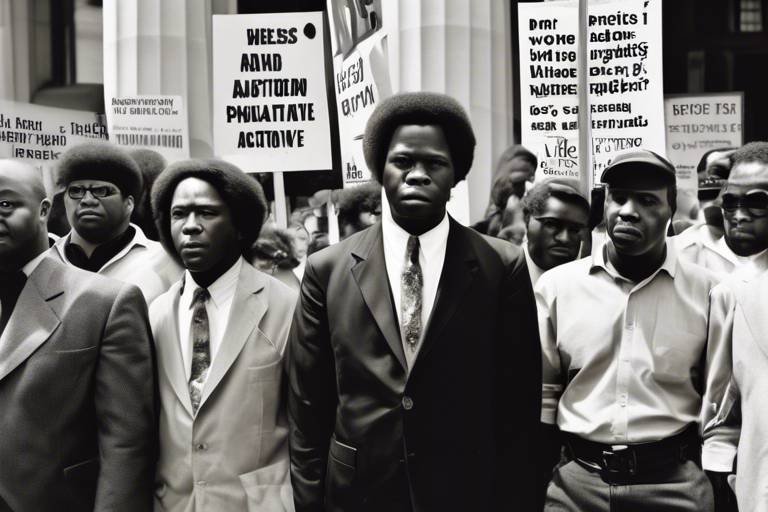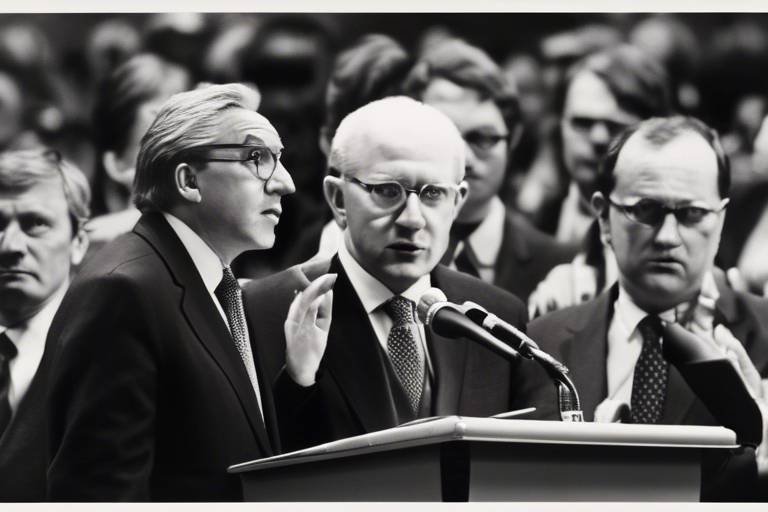Mindful Politics: The Influence of Eastern Philosophy
In an era where political discourse often feels fragmented and contentious, the integration of Eastern philosophical traditions offers a refreshing perspective. Mindfulness, a key tenet of these traditions, encourages individuals to be present, aware, and compassionate. This approach can profoundly shape political discourse and decision-making, leading to a more holistic and empathetic governance model. Imagine a world where political leaders prioritize understanding and collaboration over conflict and division—this is the promise of mindful politics.
The teachings of Eastern philosophies, particularly Taoism and Buddhism, emphasize the interconnectedness of all beings and the importance of harmony. By adopting these principles, political leaders can foster an environment where dialogue thrives, and diverse perspectives are valued. This shift towards a more compassionate approach not only enhances the quality of political decisions but also cultivates trust between leaders and the communities they serve.
As we delve deeper into the influence of Eastern philosophy on politics, we will explore how mindfulness can transform political leadership, enhance community engagement, and promote ethical governance. The journey toward mindful politics is not just an abstract idea; it is a tangible path that can lead to real change in our political systems. Are you ready to discover how these ancient teachings can illuminate the complexities of modern governance?
To understand the influence of Eastern philosophy on politics, we must first grasp its foundational concepts. Taoism, for instance, teaches us about the natural flow of life and the importance of aligning our actions with this flow. It emphasizes the idea of wu wei, or effortless action, which encourages leaders to act thoughtfully rather than react impulsively. On the other hand, Buddhism introduces the principles of compassion and mindfulness, urging individuals to cultivate awareness and empathy in their interactions.
These philosophies advocate for a deeper understanding of human nature and the complexities of societal dynamics. By embracing these teachings, political leaders can approach governance with a sense of responsibility and care, recognizing the profound impact their decisions have on the lives of others. This perspective fosters a political culture that values collaboration over competition, ultimately leading to more effective and inclusive governance.
Mindfulness is not merely a buzzword; it is a transformative practice that can enhance political leadership. When leaders engage in mindfulness practices, they develop greater emotional intelligence, allowing them to navigate the complexities of human relationships with grace and understanding. This heightened awareness enables them to make more thoughtful decisions that reflect the needs and values of their constituents.
Consider the impact of a leader who takes a moment to pause and reflect before responding to a crisis. Instead of reacting out of fear or anger, they can approach the situation with clarity and compassion. This shift in perspective can lead to solutions that prioritize the common good, ultimately fostering a more harmonious society.
Throughout history, we can find examples of political leaders who have embraced mindfulness in their leadership styles. For instance, Jacinda Ardern, former Prime Minister of New Zealand, has been praised for her empathetic approach to governance, particularly during crises like the Christchurch mosque shootings. Her ability to connect with the public on an emotional level exemplifies the positive effects of mindfulness in leadership.
Similarly, Barack Obama has often spoken about the importance of reflection and mindfulness in his decision-making process. His emphasis on listening and understanding diverse perspectives has contributed to a more inclusive political environment. These leaders demonstrate that integrating mindfulness into politics is not only possible but can lead to significant improvements in governance and public trust.
Mindfulness can also play a crucial role in shaping policy development. By fostering a collaborative atmosphere, leaders can engage various stakeholders in the decision-making process. This approach not only enhances the quality of policies but also ensures that they reflect the needs and aspirations of the community.
For instance, when leaders prioritize community engagement, they create an environment where citizens feel valued and heard. This can lead to policies that promote sustainability and social equity, addressing pressing issues such as climate change and inequality. The integration of mindfulness into policy development ultimately paves the way for a more just and equitable society.
Despite the numerous benefits of integrating mindfulness into politics, some challenges and critiques must be addressed. One concern is the potential for superficial practices that lack authenticity. It's crucial for leaders to genuinely embody the principles of mindfulness rather than merely adopting them as a trend.
Moreover, there is a risk that mindfulness practices could be perceived as a distraction from pressing political issues. Critics argue that while mindfulness can enhance personal well-being, it should not replace the need for systemic change. Therefore, it is essential for leaders to strike a balance between mindfulness practices and the urgent demands of governance.
Eastern philosophical principles can significantly enhance community engagement in the political process. By promoting active participation and dialogue among citizens, mindfulness encourages a sense of belonging and ownership in the democratic process. When individuals feel connected to their communities, they are more likely to engage in meaningful discussions and advocate for change.
Imagine a town hall meeting where citizens share their thoughts and ideas openly, fostering a sense of unity and collaboration. This kind of engagement not only enriches the political landscape but also empowers individuals to take an active role in shaping their communities. As we explore the intersection of mindfulness and community engagement, we uncover the potential for a more vibrant and participatory democracy.
At the core of Eastern philosophies lies a commitment to ethical governance. These traditions emphasize the importance of compassion, harmony, and responsibility in political decision-making. By integrating these values into governance, leaders can create a political culture that prioritizes the well-being of all citizens.
For example, the concept of compassionate leadership encourages leaders to consider the impact of their decisions on marginalized communities. This approach fosters a sense of responsibility and accountability, ultimately leading to more equitable policies. As we explore the ethical implications of Eastern thought, we begin to see how these principles can guide political leaders toward a more just and humane governance model.
When comparing Eastern ethical frameworks with Western philosophies, we find unique insights that can inform contemporary political ethics. While Western philosophies often emphasize individualism and competition, Eastern philosophies advocate for interconnectedness and collaboration. This contrast highlights the potential for a more holistic approach to ethics in politics.
By embracing Eastern ethical principles, political leaders can cultivate a culture of empathy and understanding. This shift encourages leaders to prioritize the common good over personal interests, ultimately fostering a more ethical and responsible political landscape.
As we consider the future implications of integrating Eastern philosophy into political systems, we can envision a transformative shift in public policy, governance styles, and civic engagement. By prioritizing mindfulness and compassion, leaders can create a more inclusive and equitable society.
Imagine a future where political discourse is characterized by understanding and collaboration, where community voices are heard and valued. This vision is not merely a dream; it is a possibility that can be realized through the principles of mindful politics. As we move forward, let us embrace the teachings of Eastern philosophy to guide us toward a more compassionate and just world.
- What is mindfulness in politics? Mindfulness in politics refers to the practice of being present and aware in decision-making, promoting empathy and thoughtful engagement with constituents.
- How can Eastern philosophy influence political leadership? Eastern philosophy emphasizes interconnectedness and compassion, encouraging leaders to prioritize the well-being of their communities over personal interests.
- Are there any challenges to integrating mindfulness into politics? Yes, challenges include concerns about authenticity and the potential for mindfulness practices to distract from pressing political issues.
- What are some examples of mindful political leaders? Leaders like Jacinda Ardern and Barack Obama have demonstrated the positive effects of mindfulness in their leadership styles.

The Roots of Eastern Philosophy
When we dive into the rich tapestry of Eastern philosophy, we find ourselves exploring a world where thoughts, beliefs, and practices intertwine to shape not just individual lives, but entire societies. Eastern philosophy, with its roots in ancient traditions such as Taoism and Buddhism, offers a profound lens through which we can view the complexities of human existence and governance. These philosophies emphasize harmony, balance, and the interconnectedness of all things, which can serve as a refreshing antidote to the often fragmented and divisive nature of contemporary political discourse.
At the heart of Taoism lies the concept of the Tao, or "the Way," which advocates for living in accordance with the natural flow of the universe. This idea encourages individuals to embrace simplicity and spontaneity, fostering a sense of peace and acceptance. In contrast, Buddhism introduces the notion of mindfulness and the importance of understanding suffering as a fundamental aspect of life. By acknowledging and addressing suffering, individuals can cultivate compassion, not only for themselves but for others as well. This duality of thought—embracing both the natural order and the quest for compassion—can significantly influence how political leaders approach governance.
Moreover, the teachings of these philosophies can be distilled into several key principles that resonate deeply in the political realm:
- Interconnectedness: Recognizing that our actions affect others fosters a sense of responsibility among leaders and citizens alike.
- Compassion: Making decisions that prioritize the well-being of all individuals can lead to a more just society.
- Balance: Striving for equilibrium in policy-making can help avoid extremes and promote sustainability.
As we reflect on these principles, it becomes evident that Eastern philosophy is not merely an abstract concept but a practical framework that can guide political thought and action. By integrating these ideas into political discourse, we can cultivate a more holistic approach to governance that values empathy and collective well-being over individual gain.
In essence, understanding the roots of Eastern philosophy invites us to reconsider the ways in which we engage with politics. It challenges us to look beyond the surface and recognize the deeper connections that bind us together as a community. As we explore the implications of these philosophies on modern political leadership, we open the door to a new era of governance—one that is characterized by mindfulness, compassion, and a commitment to the greater good.

Mindfulness in Political Leadership
In today's fast-paced world, where political landscapes are often marred by conflict and division, the concept of mindfulness emerges as a beacon of hope. Imagine a political leader who approaches their role not just with ambition but with a deep sense of awareness and presence. This is the essence of mindfulness in political leadership—a practice that encourages leaders to pause, reflect, and act with intention. It’s about cultivating a mental space where decision-making is not merely a reaction to immediate pressures but a thoughtful response grounded in compassion and understanding.
Mindfulness enables leaders to enhance their emotional intelligence, allowing them to connect with their constituents on a deeper level. When leaders practice mindfulness, they become more attuned to the needs and concerns of the people they serve. This heightened awareness can lead to more inclusive and equitable policies. Think about it: when leaders are present and engaged, they can better understand the complexities of the issues at hand, resulting in decisions that truly reflect the will of the people.
Moreover, mindfulness fosters a culture of collaboration and dialogue. Rather than viewing governance as a zero-sum game, mindful leaders are more likely to approach challenges as opportunities for collective problem-solving. For instance, consider how a mindful approach could transform contentious debates into constructive discussions. Instead of escalating tensions, leaders who practice mindfulness can create an environment where diverse perspectives are valued, leading to innovative solutions that serve the common good.
But how does one cultivate mindfulness in the political sphere? It often begins with simple practices such as meditation, deep breathing, or even mindful listening. These techniques can help leaders manage stress and maintain clarity in their thought processes. Picture a leader stepping back from a heated debate to take a few deep breaths, allowing themselves to regroup before responding. This moment of mindfulness can make all the difference, transforming a potentially explosive situation into a constructive conversation.
To illustrate the impact of mindfulness on political leadership, let's take a look at a few notable examples:
| Leader | Mindfulness Practice | Impact on Leadership |
|---|---|---|
| Jacinda Ardern | Regular meditation | Promoted empathy and inclusivity in governance |
| Barack Obama | Daily exercise and reflection | Enhanced emotional intelligence and decision-making |
| Angela Merkel | Mindful listening | Fostered collaboration and consensus-building |
These leaders exemplify how integrating mindfulness into their leadership styles has not only benefited their personal well-being but has also strengthened public trust and engagement. When constituents see their leaders practicing mindfulness, it sends a powerful message that they are committed to serving the community with integrity and compassion.
However, it's essential to acknowledge that the journey toward mindful leadership is not without challenges. Critics may argue that mindfulness can be superficial or co-opted as a buzzword without genuine implementation. Therefore, it is crucial for leaders to approach mindfulness authentically, ensuring that their practices align with their values and actions. Only then can mindfulness truly reshape political leadership for the better.
In conclusion, embracing mindfulness in political leadership holds the potential to transform not just individual leaders but the entire political landscape. By fostering awareness, emotional intelligence, and collaborative dialogue, mindful leaders can pave the way for a more compassionate and effective governance model. As we move forward, the question remains: how can we encourage more leaders to adopt these practices for the benefit of all?

Case Studies of Mindful Leaders
When we think about political leaders, the image that often comes to mind is one of rigidity, power struggles, and cutthroat competition. However, there are remarkable examples of leaders who have embraced mindfulness and Eastern philosophical principles, creating a more compassionate and effective political environment. These leaders demonstrate that incorporating mindfulness into governance can lead to better decision-making and foster a culture of trust and collaboration.
One standout example is Jacinda Ardern, the former Prime Minister of New Zealand. Ardern's leadership style is characterized by empathy and a strong sense of community. During crises, such as the Christchurch mosque shootings in 2019, she exemplified mindful leadership by prioritizing compassion and unity over fear and division. Her approach not only comforted the nation but also set a powerful example of how a leader can respond with grace and sensitivity, reinforcing the idea that mindfulness can be a strength in political leadership.
Another inspiring case is that of Angela Merkel, the former Chancellor of Germany, known for her pragmatic and thoughtful approach to governance. Merkel often emphasized the importance of dialogue and collaboration, traits deeply rooted in Eastern philosophies. Her ability to listen and consider multiple perspectives before making decisions showcases how mindfulness can enhance a leader's effectiveness. Under her leadership, Germany navigated numerous challenges, including economic crises and refugee integration, demonstrating that a mindful approach can lead to sustainable and ethical solutions.
Moreover, we can look at the example of Barack Obama, who often spoke about the significance of empathy and understanding in leadership. Obama’s presidency was marked by efforts to bridge divides and foster inclusivity, reflecting a mindful approach to governance. His use of mindfulness practices, such as meditation, helped him maintain clarity and focus in the face of overwhelming challenges, illustrating that even in high-pressure environments, a mindful leader can steer their country towards progress.
These leaders share common traits that highlight the benefits of mindfulness in political leadership:
- Empathy: They prioritize understanding the needs and concerns of their constituents.
- Resilience: Mindfulness helps them remain calm and composed during crises.
- Collaboration: They foster a culture of teamwork and inclusivity, encouraging diverse voices in decision-making.
In addition to these individual examples, we can observe how mindful leadership translates into tangible policy outcomes. For instance, under Ardern's leadership, New Zealand implemented progressive policies on mental health and climate change, reflecting a commitment to the common good. Similarly, Merkel's focus on sustainable energy initiatives has had lasting impacts on both Germany and the global community.
As we analyze these case studies, it becomes evident that the integration of Eastern philosophical principles into political leadership not only enhances individual effectiveness but also contributes to a more harmonious society. By embracing mindfulness, these leaders have demonstrated that politics can be a platform for compassion and positive change, inspiring a new generation of leaders to follow suit.
In conclusion, the case studies of Jacinda Ardern, Angela Merkel, and Barack Obama provide powerful illustrations of how mindful leadership can transform political discourse and decision-making. As we move forward, it is crucial to recognize and support leaders who embody these principles, paving the way for a more compassionate and effective political landscape.
Q: What is mindful leadership?
A: Mindful leadership refers to a leadership style that incorporates mindfulness practices, emphasizing awareness, empathy, and thoughtful decision-making.
Q: How can mindfulness impact political decision-making?
A: Mindfulness can lead to more thoughtful and compassionate decisions, fostering collaboration and enhancing emotional intelligence among leaders.
Q: Are there any challenges to implementing mindfulness in politics?
A: Yes, challenges include concerns about authenticity and the potential for superficial practices if mindfulness is not genuinely embraced.

Impact on Policy Development
When we think about policy development, the traditional image that often comes to mind is one of bureaucrats, numbers, and regulations. However, integrating mindfulness into this process can transform it into something much more profound and impactful. Imagine a world where policymakers approach their work with a sense of awareness, compassion, and a genuine desire to serve the community. This is not just a lofty ideal; it’s a practical approach that can lead to more effective governance.
One of the primary benefits of mindfulness in policy development is the emphasis on collaborative approaches. When leaders practice mindfulness, they are more likely to listen actively and engage in meaningful dialogues with stakeholders. This creates an environment where diverse perspectives are valued, leading to policies that reflect the needs and desires of the community. For instance, consider a city council debating a new public transportation initiative. A mindful approach would encourage council members to not only present their viewpoints but also to listen to the concerns of residents, transit workers, and environmental advocates. This kind of engagement fosters a sense of ownership and trust among citizens, making them feel like active participants in the democratic process.
Moreover, mindfulness encourages a focus on long-term outcomes rather than short-term gains. In the fast-paced world of politics, it can be all too easy to prioritize immediate results over sustainable solutions. However, when leaders incorporate mindfulness into their decision-making, they are more likely to consider the broader implications of their policies. For example, a mindful approach to environmental policy could lead to initiatives that not only address current issues but also promote sustainability for future generations. This shift in perspective can lead to innovative solutions that prioritize community well-being and ecological balance.
In practice, this might look like a policy development process that includes regular mindfulness sessions for leaders and stakeholders, allowing them to reflect on their motivations and the potential impact of their decisions. This practice can help prevent burnout and promote a healthier work environment, ultimately leading to more thoughtful and effective policies. Furthermore, by incorporating techniques such as meditation and mindful communication, policymakers can cultivate a more compassionate approach to governance.
To illustrate the impact of mindfulness on policy development, let’s look at a few key areas:
| Key Area | Mindful Approach | Potential Outcomes |
|---|---|---|
| Community Health | Involve community voices in health initiatives | More effective and accepted health policies |
| Environmental Policy | Focus on sustainability and long-term impacts | Stronger ecological protections and community benefits |
| Education Reform | Engage educators and parents in discussions | Policies that better reflect the needs of students |
As we can see, the integration of mindfulness into policy development does not merely enhance the process; it fundamentally transforms it. By fostering collaboration, focusing on long-term sustainability, and encouraging community engagement, mindfulness creates a political landscape that is not only more effective but also more humane. This approach nurtures a culture of responsibility and compassion, paving the way for policies that truly serve the public good.
- What is mindfulness in politics? Mindfulness in politics refers to the practice of being present and fully engaged in the political process, focusing on compassion and collaboration rather than mere transactional interactions.
- How can mindfulness improve policy development? By promoting active listening, empathy, and long-term thinking, mindfulness can lead to more inclusive and effective policies that address the needs of the community.
- Are there examples of mindful leaders? Yes, several political leaders around the world have adopted mindfulness practices, resulting in improved governance and public trust.

Challenges and Critiques
While the integration of mindfulness into politics presents a promising avenue for more compassionate governance, it is not without its challenges and critiques. One major concern is the issue of authenticity. Critics argue that some political leaders may adopt mindfulness practices merely as a façade, a trend to appear more in touch with their constituents without genuinely committing to the principles of mindfulness. This raises the question: can mindfulness really influence governance if it’s merely a performative act? The answer lies in the depth of understanding and application of these practices.
Another critique revolves around the potential for superficiality. Mindfulness requires a deep, often personal journey of self-awareness and emotional intelligence, which can be difficult to maintain in the fast-paced and often cutthroat world of politics. If mindfulness is treated as just another tool or buzzword, its transformative power can be lost, leading to a mere gloss over the deeper issues at play. For instance, if a leader participates in a mindfulness retreat but returns to the same divisive tactics, the efficacy of mindfulness in fostering genuine dialogue and understanding is called into question.
Moreover, the application of Eastern philosophical principles in a predominantly Western political landscape can lead to cultural misunderstandings. The essence of mindfulness is rooted in specific cultural contexts, and transplanting these ideas without respecting their origins can lead to misinterpretation or appropriation. This can create a disconnect between leaders and the communities they serve, particularly among those who may feel that their cultural heritage is being diluted or misrepresented.
Additionally, there is the challenge of balancing mindfulness with urgency. In many political situations, especially during crises, the need for swift action can clash with the reflective nature of mindfulness practices. Politicians may struggle to find the right balance between taking immediate action and pausing to consider the broader implications of their decisions. This tension can lead to frustration among constituents who may feel that their leaders are either too slow to respond or too hasty in their decision-making.
In summary, while the idea of mindful politics is appealing, it is essential to approach it with a critical eye. The challenges of authenticity, superficiality, cultural sensitivity, and the balance between mindfulness and urgency must be navigated carefully to ensure that the integration of Eastern philosophies into political practices is both meaningful and effective.
- What is mindfulness in politics? Mindfulness in politics refers to the practice of being present and aware in decision-making processes, promoting compassion and thoughtful governance.
- How can mindfulness improve political leadership? Mindfulness can enhance emotional intelligence, foster better communication, and encourage leaders to consider the common good over personal or partisan interests.
- Are there any risks associated with adopting mindfulness in politics? Yes, potential risks include superficial adoption of mindfulness practices and the challenge of balancing reflective decision-making with the need for urgent action.
- How does Eastern philosophy influence Western political thought? Eastern philosophies, particularly those emphasizing compassion and harmony, can offer alternative perspectives on ethics and governance that challenge traditional Western models.

Community Engagement and Mindfulness
In today’s fast-paced world, where political discourse often feels like a cacophony of competing voices, the principles of Eastern philosophy, particularly mindfulness, can serve as a beacon of hope for community engagement. Imagine a political landscape where citizens feel genuinely heard, where discussions are not just about winning arguments but about fostering understanding. This is the essence of mindful politics, where the focus shifts from the individual to the collective well-being.
Mindfulness encourages individuals to be present in the moment and to engage with others with empathy and compassion. When applied to community engagement, this means creating spaces where dialogue flourishes, and everyone has a seat at the table. Picture a town hall meeting where instead of shouting over one another, participants take turns sharing their thoughts, listening actively, and responding thoughtfully. This approach not only enhances communication but also builds trust among community members.
Furthermore, the integration of mindfulness into community engagement can lead to more inclusive decision-making processes. When leaders practice mindfulness, they are better equipped to recognize the diverse needs of their constituents. They can facilitate discussions that reflect the values of the community, ensuring that policies are not only effective but also resonate with the people they are meant to serve. The result? A more cohesive community that feels valued and involved in the political process.
To illustrate this point, consider the following table that outlines the benefits of mindfulness in community engagement:
| Benefits of Mindfulness | Description |
|---|---|
| Enhanced Listening | Mindfulness fosters active listening, allowing individuals to truly understand different perspectives. |
| Increased Empathy | By being present, individuals can connect on a deeper emotional level, promoting compassion. |
| Collaborative Solutions | Mindful discussions lead to creative problem-solving that incorporates diverse viewpoints. |
| Stronger Community Bonds | Engagement rooted in mindfulness builds trust and strengthens relationships among community members. |
However, fostering community engagement through mindfulness isn’t without its challenges. One potential hurdle is the ingrained habit of fast-paced, reactionary communication that dominates our current political climate. To combat this, communities can implement mindfulness training programs, encouraging members to practice patience and compassion in their interactions. Workshops, retreats, and even online resources can help individuals cultivate these skills, ultimately leading to a more engaged and harmonious community.
In conclusion, the intersection of community engagement and mindfulness offers a transformative approach to political discourse. By prioritizing presence, empathy, and collaboration, communities can create a political environment that is not only more inclusive but also more effective. As we move forward, let’s embrace the teachings of Eastern philosophy and strive for a political landscape where every voice matters, and every individual feels empowered to contribute to the greater good.
- What is mindfulness in the context of politics? Mindfulness in politics refers to the practice of being present and aware during political discussions, fostering empathy, and promoting thoughtful decision-making.
- How can mindfulness improve community engagement? Mindfulness enhances community engagement by encouraging active listening, empathy, and collaborative problem-solving, leading to more inclusive and effective decision-making processes.
- Are there any challenges to implementing mindfulness in politics? Yes, challenges include overcoming ingrained habits of reactive communication and ensuring that mindfulness practices are authentic and not superficial.

Ethical Governance through Eastern Thought
When we think about governance, the first thing that often comes to mind is the structure, the laws, and the political maneuvers that keep a society functioning. But what if we shifted our focus? What if we looked at governance through the lens of Eastern thought? Eastern philosophies, such as Buddhism and Confucianism, offer profound insights into the nature of ethical governance that can reshape our understanding of political responsibility and decision-making. These philosophies emphasize compassion, harmony, and a deep sense of responsibility towards others, which can lead to a more humane and effective governance model.
One of the key tenets of Eastern philosophy is the idea of interconnectedness. This principle suggests that every action has a ripple effect, impacting not just individuals but the entire community. Imagine a stone dropped into a pond; the ripples spread out, affecting everything in their path. In governance, this means that leaders must consider the broader implications of their decisions, fostering a sense of collective well-being rather than merely focusing on individual gain. This approach encourages leaders to act with integrity and foresight, understanding that their choices can either uplift or harm the community.
Moreover, ethical governance through Eastern thought challenges the often adversarial nature of Western political systems. Instead of viewing politics as a battleground where winners and losers emerge, Eastern philosophies advocate for a more collaborative approach. By prioritizing dialogue and mutual respect, leaders can create policies that reflect the needs and aspirations of the entire community. This shift from competition to cooperation can lead to a more stable and harmonious society.
Incorporating Eastern ethical principles into governance also means embracing the concept of mindfulness. Mindfulness encourages individuals, including leaders, to be present and aware of their thoughts and feelings, which can lead to more thoughtful and compassionate decision-making. When leaders practice mindfulness, they are more likely to listen actively, empathize with others, and consider the long-term consequences of their actions. This, in turn, fosters a culture of trust and transparency within governance structures.
To illustrate the impact of these principles, consider the following table that outlines the core values of Eastern philosophical traditions and their implications for ethical governance:
| Eastern Philosophy | Core Values | Implications for Governance |
|---|---|---|
| Buddhism | Compassion, Interconnectedness | Promotes policies that prioritize community welfare and social equity. |
| Taoism | Harmony, Natural Order | Encourages sustainable practices and respect for the environment in policy-making. |
| Confucianism | Respect, Responsibility | Fosters ethical leadership and accountability within political structures. |
In conclusion, integrating Eastern thought into governance not only enriches our understanding of ethics but also provides practical frameworks for creating a more just and equitable society. As we navigate the complexities of modern politics, embracing these philosophies can inspire leaders to act with greater integrity and compassion, ultimately leading to a political landscape that prioritizes the well-being of all.
- What are the main philosophies influencing ethical governance? The main philosophies include Buddhism, Taoism, and Confucianism, each offering unique insights into compassion, harmony, and responsibility.
- How can mindfulness improve political decision-making? Mindfulness encourages leaders to be present and aware, leading to more thoughtful, compassionate, and long-term focused decisions.
- What are the challenges of integrating Eastern thought in Western governance? Challenges include skepticism about authenticity and potential superficial adoption of practices without genuine understanding.

Comparative Approaches to Ethics
When diving into the realm of ethics, it’s fascinating to observe how different cultures and philosophies shape our understanding of right and wrong. Eastern philosophies, particularly those rooted in Taoism and Buddhism, offer unique perspectives that often contrast sharply with their Western counterparts. For instance, while Western ethics frequently emphasize individual rights and rationality, Eastern thought tends to focus on collective harmony and interconnectedness. This fundamental difference can lead to diverse approaches in political ethics and governance.
In the West, ethical frameworks like utilitarianism and deontology prioritize the consequences of actions or adherence to rules, respectively. Utilitarianism, championed by philosophers like John Stuart Mill, suggests that the morality of an action is determined by its outcome, specifically the greatest happiness for the greatest number. On the other hand, deontological ethics, as articulated by Immanuel Kant, focuses on the inherent morality of actions themselves, regardless of their outcomes. This often leads to a rigid adherence to laws and principles, which can sometimes overlook the nuances of human experience.
In contrast, Eastern ethical systems encourage a more fluid and compassionate approach. For example, Buddhism introduces the concept of compassionate action, urging individuals to consider the impact of their decisions on all sentient beings. This perspective fosters a sense of responsibility that transcends personal gain, promoting a more inclusive and empathetic political climate. Similarly, Taoism emphasizes living in harmony with the Tao, or the natural order of the universe, which encourages leaders to adopt a more holistic view of governance that prioritizes balance and sustainability.
To illustrate these differences, consider the following table that compares key elements of Eastern and Western ethical approaches:
| Aspect | Eastern Ethics | Western Ethics |
|---|---|---|
| Focus | Collective harmony and interconnectedness | Individual rights and rationality |
| Decision-making | Compassion and empathy | Consequences and rules |
| Goal | Balance and sustainability | Maximizing happiness or adherence to duty |
This comparative analysis reveals that integrating Eastern ethical principles into contemporary political discourse could lead to a more holistic and compassionate governance. By prioritizing community well-being and fostering a dialogue that values all voices, we can create a political landscape that is not only effective but also ethical.
As we look to the future, the potential for blending these ethical frameworks presents an exciting opportunity for political leaders and citizens alike. Imagine a world where policies are crafted not just with the goal of maximizing economic growth but also with the intention of nurturing the social fabric of our communities. This fusion of Eastern and Western thought could pave the way for a new era of ethical governance that truly reflects the needs of the people.
- What are the main differences between Eastern and Western ethics?
Eastern ethics often emphasize community and interconnectedness, while Western ethics focus on individual rights and rationality. - How can Eastern philosophies influence political decision-making?
By promoting compassion and holistic approaches, Eastern philosophies can lead to more thoughtful and inclusive governance. - Are there any practical examples of Eastern ethics in politics?
Yes, many leaders are adopting mindfulness and compassionate action principles in their policies, fostering community engagement and sustainable practices.

Future Implications of Mindful Politics
As we look to the horizon of political landscapes, the integration of mindfulness into governance holds transformative potential. Imagine a world where political leaders are not just decision-makers but also compassionate listeners, where policies are crafted not solely on data but on a deep understanding of human experience. This shift could lead to a more empathetic political climate, one that prioritizes the well-being of all citizens. The implications of this are profound and multifaceted.
One of the most significant implications of mindful politics is the potential for increased civic engagement. When leaders model mindfulness, they set an example for their constituents. Citizens may feel inspired to engage more actively in political discussions, participate in community initiatives, and voice their concerns and ideas. This could foster a culture of dialogue, where diverse perspectives are not only welcomed but actively sought. In this environment, the political process can become more inclusive, reflecting the true fabric of society.
Moreover, the infusion of mindfulness into policy-making can lead to a shift in how we address pressing global issues such as climate change, social justice, and public health. Mindful leaders are likely to prioritize long-term sustainability over short-term gains, considering the broader impact of their decisions. For instance, rather than rushing to implement policies that may have immediate benefits but long-term consequences, mindful governance encourages a thorough evaluation of potential outcomes. This could result in more comprehensive environmental policies, equitable healthcare systems, and initiatives that genuinely address the needs of marginalized communities.
However, the transition to mindful politics is not without its challenges. Critics may argue that the practice of mindfulness can be superficial, a mere trend rather than a genuine approach to governance. Others might question the authenticity of leaders who adopt mindfulness practices, fearing that it could be used as a public relations tool rather than a sincere commitment to ethical leadership. To counter these concerns, it is crucial for leaders to engage in authentic mindfulness practices that are deeply rooted in their values and community needs, rather than as a performance for public approval.
Furthermore, the potential for collaboration among political leaders who embrace mindfulness can lead to a more unified approach to governance. Imagine a scenario where leaders from different parties come together to discuss policies not from a place of division, but from a shared commitment to the greater good. This collaborative spirit can break down partisan barriers, creating a political environment where compromise and consensus are possible.
In conclusion, the future of mindful politics is not just about individual leaders adopting new practices; it is about a systemic transformation in how we approach governance. By fostering a culture of mindfulness, we can cultivate a political landscape that values compassion, inclusivity, and long-term sustainability. As we embark on this journey, it is essential to remain vigilant against the pitfalls of superficiality and to commit to genuine engagement with the principles of Eastern philosophy. The potential for a brighter, more harmonious future is within our grasp, and it begins with the mindful choices we make today.
- What is mindful politics? Mindful politics refers to a governance approach that incorporates principles of mindfulness, emphasizing compassion, awareness, and ethical decision-making.
- How can mindfulness improve political leadership? Mindfulness can enhance emotional intelligence, promote thoughtful decision-making, and foster a greater focus on the common good among political leaders.
- What are some examples of mindful leaders? Leaders who practice mindfulness may include those who prioritize community engagement, listen actively to diverse perspectives, and advocate for sustainable policies.
- What challenges exist in integrating mindfulness into politics? Challenges include concerns about authenticity, the risk of superficial practices, and potential resistance from traditional political structures.
Frequently Asked Questions
- What is Eastern philosophy and how does it relate to politics?
Eastern philosophy encompasses a variety of spiritual and philosophical traditions from Asia, including Buddhism, Taoism, and Confucianism. These philosophies emphasize concepts like mindfulness, compassion, and harmony, which can profoundly influence political discourse, encouraging leaders to adopt a more holistic and empathetic approach to governance.
- How can mindfulness benefit political leaders?
Mindfulness can enhance political leaders' decision-making abilities by fostering greater emotional intelligence and self-awareness. When leaders practice mindfulness, they can approach challenges with a calm and focused mindset, leading to decisions that prioritize the common good and reflect a deeper understanding of their constituents' needs.
- Are there examples of political leaders who practice mindfulness?
Yes! Several political leaders around the world have integrated mindfulness into their leadership styles. For instance, leaders like Jacinda Ardern of New Zealand have been known to prioritize empathetic communication and community engagement, showcasing how mindfulness can positively affect governance and public trust.
- What impact does mindfulness have on policy development?
Mindfulness encourages collaborative approaches to policy development, focusing on community well-being and sustainable practices. By promoting open dialogue and active participation among stakeholders, mindfulness can lead to more inclusive policies that address the needs of diverse populations.
- What challenges are associated with integrating mindfulness into politics?
While integrating mindfulness into politics has its benefits, challenges include concerns about authenticity and the risk of superficial practices. Critics argue that without genuine commitment, mindfulness can become a mere buzzword rather than a transformative practice that leads to meaningful change.
- How can Eastern philosophy enhance community engagement in politics?
Eastern philosophical principles, such as inclusivity and active participation, encourage citizens to engage in the political process. By fostering a sense of community and belonging, these philosophies can promote dialogue and collaboration among citizens, making political systems more responsive to the needs of the people.
- What is ethical governance according to Eastern thought?
Ethical governance in Eastern thought emphasizes compassion, harmony, and responsibility in decision-making. It encourages leaders to consider the broader impact of their choices on society and the environment, promoting policies that reflect a deep sense of care for the community and future generations.
- How do Eastern and Western ethical frameworks compare?
Eastern ethical frameworks often prioritize communal well-being and interconnectedness, while Western philosophies may focus more on individual rights and rationality. By comparing these approaches, we can gain unique insights that can inform and enrich contemporary political ethics and practices.
- What are the future implications of mindful politics?
Integrating Eastern philosophy into political systems could lead to significant shifts in public policy and governance styles. As mindfulness becomes more prevalent, we may see increased civic engagement, more compassionate leadership, and policies that prioritize sustainability and community welfare.



















